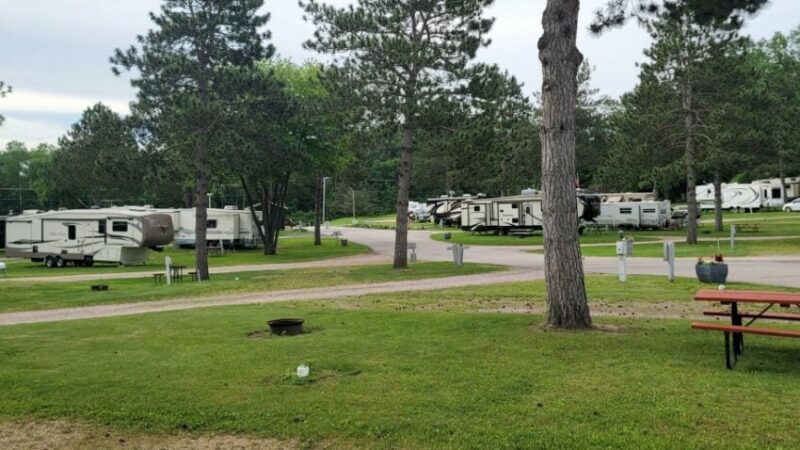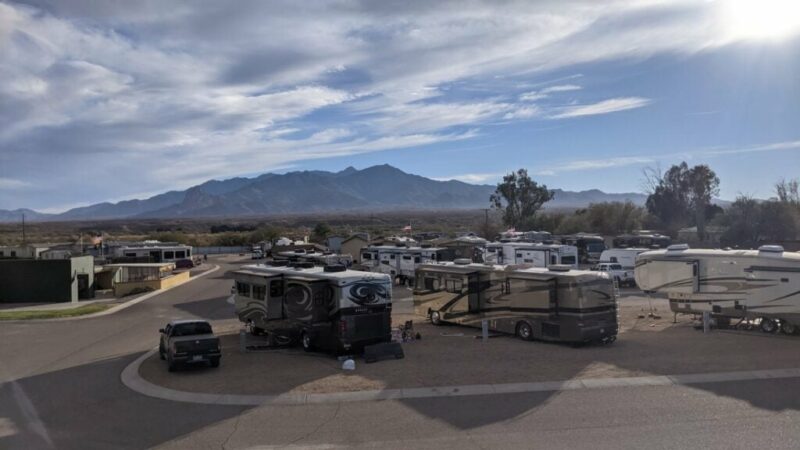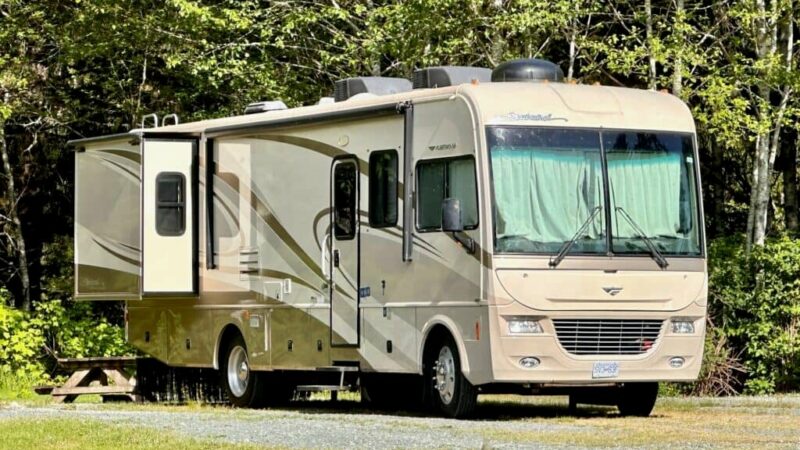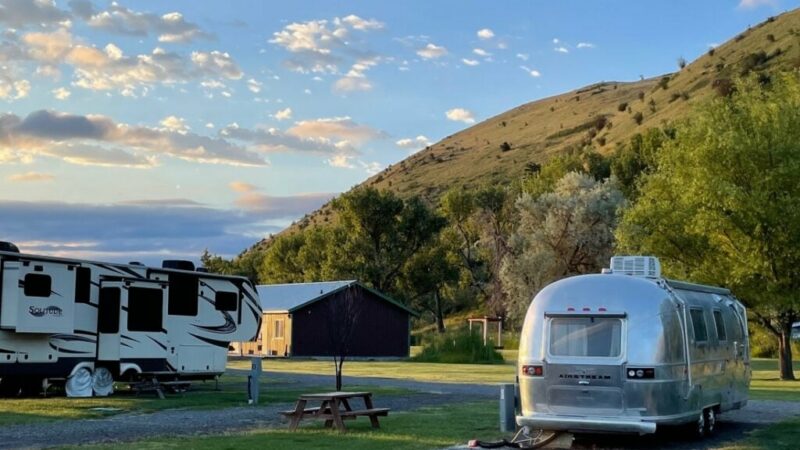Retiring In An RV: Is It Right For You?

Is The RV Lifestyle Right For Your Retirement?
You are the only one who can decide if an RV retirement is right for you. Do you love camping and spending time outdoors? Do you love exploring new places? Do you dream of traveling? If you gave a resounding yes to any of these questions, then retiring in an RV might be for you.
There are some other questions that you might need to answer before you hit the road. Does living in a relatively small space bother you? Do you feel comfortable with your retirement pay and maybe a nest egg you’ve been saving? Are you ready to roll with the punches when things don’t go the way you expected?
Retiring in an RV can be a great option. As with anything, it can have its good days and bad days. If you are ready to live life on the edge, make memories, and have great adventures, then come along for the RV ride. I would guess you won’t regret a minute.
Can I retire and live in an RV?
Yes, you can retire and live in an RV. If that is your desire, you can make it work. If you are financially sound to begin with, an RV lifestyle might make your retirement money go a little further. There are also ways to fund your lifestyle if you need to, with work camping, online jobs, or short-term freelance or seasonal work.
How much does it cost to live in an RV?
The cost to live in an RV can vary depending on where you live and how much you travel. Places to park your RV can be plentiful in Florida or Arizona, but they can also be expensive. It’s not unheard of to pay upwards of $2,000 per month for a top-of-the-line RV resort.
You also have to consider the price of gas if you travel, maintenance and repair costs, propane, campground fees, and entrance fees, to name a few. Food, internet, satellite, and more will also be on your list of expenses as well.
Of course, if you have a loan on your camper or vehicle, those will have to be included in your expenses.
Some say you can live in an RV for around $1,000 a month if you stay in one place. You won’t have gas, and there are plenty of nice campgrounds that you can live in permanently.
Instead of paying for that high-end RV resort, there are plenty of state parks, county parks, and even private campgrounds where you can stay for anywhere from $15 a night to $30 or $40 a night. If you are really adventurous, you can spend some time boondocking (staying in places for free without sewer, water, or electricity). You can pay a small yearly fee for a Harvest Hosts membership and find great free spots all around the country.
You can even get your RV site for free if you volunteer at a national or state park. You might work around 20 hours a week and get to explore the area while you are there for the season.
What is it really like to live in an RV?
As I have lived in an RV for the better part of the last five years, I’ve never felt like I wanted to live in a big house. If I start feeling cramped, I just walk out my door to beautiful forests, deserts, or mountain landscapes. I think most RVers plan to spend a lot of time outdoors anyway.
While my husband and I aren’t technically retired, we call ourselves the “working retired.” We work, camp, travel from season to season, and have a small park model in Arizona where we spend our winters. We get enough variety that we don’t get bored.
Our RV for this summer season is a 30-foot Class C. I wondered what it would be like to live in a smaller camper. Previously, we had a 37-foot travel trailer. So far, I’ve been pleased. Of course, I’ll be ready to head back to Arizona and my slightly larger park model by September.
If you can afford it, there are plenty of RVs that are big enough to make you feel like you are living in luxury.
Can you downsize?
Let me tell you the truth. Downsizing at the beginning of your RV journey is likely going to be the hardest part. If you have years of memorabilia and things you don’t want to part with, you can always get a storage space. We didn’t get any storage but left a few boxes with our parents. Things such as pictures in photo albums can be digitized. If you have children, you might give them furniture or other items that have particular meaning.
I started out wanting to hold onto everything. By the time we were done, I realized that it was all just “stuff.” If you can’t get rid of the “stuff,” then you probably don’t want to live in an RV. In the end, you will still have to get rid of things for your next step to assisted living or a nursing home. If you don’t make it that far, someone else will have to do it for you. You can’t take it with you.
I can also add that one of the unwritten rules of RVing is: If you haven’t touched an item or worn that item in a long time (some say a year), you need to get rid of it. Routine purging is a great way to make space for new things.
Do I travel or remain stationary?
While there is nothing wrong with staying in one place in your RV (we did it for around eight months), it can be confining if you don’t have plenty of friends to hang out with and things to do. An RV resort is a great option if the amenities help you get out and socialize.
How do I get medical insurance?
If you are lucky and have a pension that includes insurance, such as a teacher or government worker, you have that option. Of course, there is always Medicare at age 65. Since my husband and I aren’t there yet, we rely on the health insurance exchange. It’s inexpensive and provides pretty good coverage. These policies are state-specific, unless you are in Florida, so consider that you will be out of network if you travel outside of your state. Even with some health issues and medications, you can still make it work.
How do I get mail?
There are several ways to get mail while you are on the road. While I won’t go into all the details, you have many choices.
- Use the address of your friend or family member and have them forward your mail.
- Get a mailbox at a UPS store.
- Use a professional mail forwarding service such as Escapees, Traveling Mailbox, Good Sam Mail Services, or Dakota Post.
You will need a permanent physical address when you hit the road, and all of these options will provide that.
You might want to consider which state you want that address to be in to establish your domicile. States such as Florida, South Dakota, and Texas are very RV-friendly and have no state income tax. You will have to visit that state to establish residency, get your driver’s license, have your vehicles tagged, etc. South Dakota does require that you stay at least one night in an RV park or hotel and have a receipt to show for the stay.
Should I be a snowbird?
If you want to follow the weather, you will probably want to park your RV in Florida, Texas, or Arizona for the winter. Summers are great at a higher elevation in Colorado or in Michigan’s Upper Peninsula. Even Arizona has higher elevations where you can get out of the intense heat.
Should I retire and full-time RV?
There are so many options if you want to retire and live in an RV. There are also many opinions on the fine details of choosing this lifestyle.
If you and your spouse choose this lifestyle, or if you want to go solo, there are so many resources that will help get you down the road. Check out the many helpful resources from RV LIFE including an RV-safe trip planner and GPS directions.
I would also recommend renting an RV for a weekend or longer. This could give you the incentive to prepare for your next steps or it could help you decide that retiring full-time in an RV is not for you. Either way, make the most of your retirement and enjoy traveling, spending time with family, and taking time to enjoy nature.
Get tips from other RVers
Forums such as iRV2.com and blog sites like RV LIFE, Do It Yourself RV, and Camper Report provide all the information you need to enjoy your RV. You’ll also find brand-specific information on additional forums like Air Forums, Forest River Forums, and Jayco Owners Forum.
Related articles:
- Our Top Tips For Senior RVers Over 55
- 15 Luxury RV Resorts For Those 55 And Older
- Can You Save Money With AARP RV Camping Discounts?
The post Retiring In An RV: Is It Right For You? appeared first on RV LIFE.
Source: https://rvlife.com/rv-retiring/






